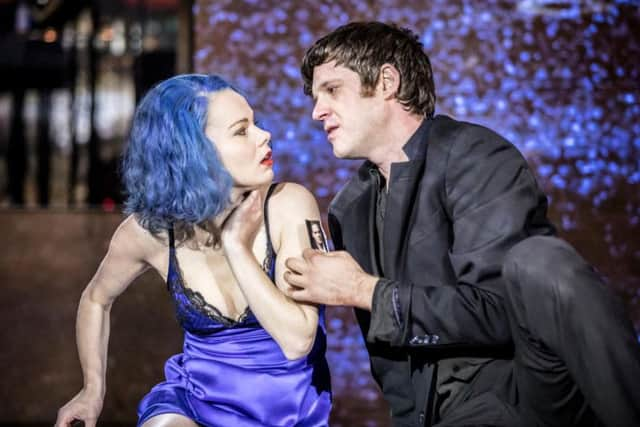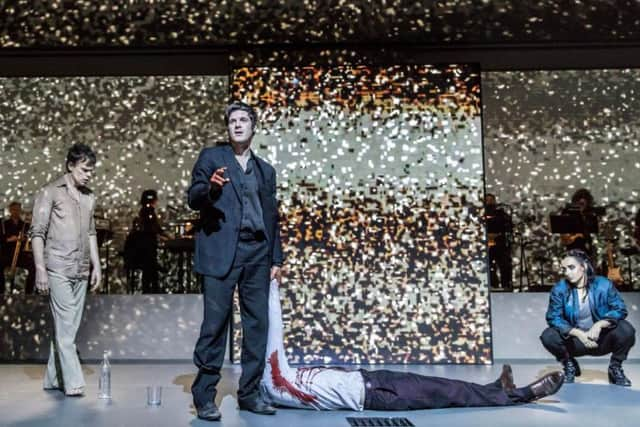Review: David Bowie's spirit rises again in Lazarus


If David Bowie often seem preoccupied with death, it's worth remembering that he seemed equally fearful of its absence. He wrote in his 1970 song The Supermen of "wondrous beings chained to life" who would play "strange games": "A man would tear his brother's flesh, a chance to die, to turn to mould." And so we find in the protagonist of Lazarus a man immune to dying, doomed to an eternity of gin-fuelled listlessness. "Now my death is more than just a sad song," Bowie wrote in 2003. So what is it now?
There are some who will be aghast that David Bowie would ever contemplate involvement in something as supposedly mainstream and middlebrow and musical theatre. Yet Lazarus is not the product of some late-life mellowing: it's the realisation of an ambition held since the dawn of his career. He wrote a rock opera in 1968 entitled Ernie Johnson. It is set at a party Ernie is throwing to celebrate his imminent suicide. For a man whose career is often viewed in tabloid terms as a series of "ch-ch-changes," some things stayed just the same.
Advertisement
Hide AdAdvertisement
Hide AdNothing came of Ernie Johnson. Bar a handful of songs, nothing came from his plan in 1974 to stage a musical based on George Orwell's 1984. Nothing came of his plan to stage a theatre piece based on his 1995 album 1.Outside and its mooted follow-ups. It seems fitting then that Bowie's last public appearance came at the opening night of Lazarus in New York, his longest-held dream finally lived. To see the play in Bowie's home town feels especially poignant.


Lazarus is not your standard jukebox musical: it's not Bowie's We Will Rock You or Mamma Mia. There is no attempt to weave a tortuous plot around his greatest hits: there is no Starman waiting in the sky while Major Tom has a Moonage Daydream and all the Rebel Rebels enjoy their Golden Years and fall in Modern Love with China Girls in Suffragette City. Indeed, none of those songs features, and nor do Ashes to Ashes, Fame, Ziggy Stardust or Let's Dance. Eight of its 17 songs were recorded in the past four years; much of the older material is rearranged and rethought, sometimes radically. The music is integral to the show, but rarely in a conventionally narrative way: it is more commonly employed to express emotion and atmosphere. Bowie once said that his concerns as a writer were less what he felt about things, and more how things felt; that sense of expressionism is this work's dominant mood.
Lazarus is ostensibly a follow-up to The Man Who Fell To Earth, a novel in whose film version Bowie played his definitive screen role as the extra-terrestrial humanoid Thomas Jerome Newton in 1976. It finds Newton living years later, barely aged, as a depressive alcoholic recluse in his sparsely furnished New York apartment. To the extent that the play has a plot, it concerns Newton's discovery of hope, in the form of a girl, leading to an attempt to escape his predicament. Other characters appear: the destructive Valentine (who happens to share his name with the protagonist of the 1960s sci-fi novel Stranger in a Strange Land, a film role in which Bowie had been interested in the early 1970s); Elly, who serves as a sort of love interest; and assorted other barely sketched individuals. There is a strong suggestion that most of them exist only in Newton's mind; indeed, Jan Versweyveld's set design, symmetrical, with two large rectangular windows, gives the impression that the entire show takes place inside someone's cranium.
And what with heads being rather messy places, what is depicted is frequently bewildering. Bowie lost interest in narrative songwriting early in his career, preferring instead to hurl images and ideas at the listener, and Lazarus follows the same modus operandi. It is visually astonishing: lighting, projection and video bring chaos, depth, beauty and mystery to the sterile domestic setting, transforming it into a sleazy nightclub, a Manhattan street, Mars and more. It is endlessly imaginative and restlessly dynamic, entrancing and unsettling, occasionally eerie and uncanny; at some points, Newton's TV screen relays the action on the stage, but is a second or two ahead of it, as if we are watching people whose behaviour is preordained. As a dramatic experience, its closest cousin is perhaps the David Lynch film Inland Empire, which presents a similar collision of sometimes apparently random concepts. Most importantly, however, in its fractured, fractious way, Lazarus is successful in conveying a kind of ineffable truth about the human condition, which is surely the most that we can expect of theatre.
Advertisement
Hide AdAdvertisement
Hide AdYet, for all that, it is the music that will attract many will be attracted to Lazarus. For the most part, this works superbly, and shows how Bowie regained and retained his artistic vitality in his later years. The Man Who Sold the World, Life On Mars? and Heroes will obviously be freighted with a great many associations in the minds of a great many observers, but here they are presented with a freshness and a clarity that elevates them beyond karaoke or tribute. Absolute Beginners is tender and romantic and heartbreaking; Always Crashing in the Same Car is imbued with regret at a sense of inevitable self-destruction. The four songs Bowie wrote specifically for the play - When I Met You, Killing a Little Time, No Plan and, most famously, Lazarus - are each effective in their own way as deeply affecting show tunes. At times, the band, who are visible throughout, sounded at this performance a little stiff and lacking in swing, but they were never less than efficient and occasionally - as with a somewhat gratuitous but emotionally overwhelming Where Are We Now? - utterly transcendent. There only moment the show came close to lapsing into musical cliche was in Changes, which is perhaps interpreted here a little too literally. But overall, Lazarus avoids any of the cringe or clumsiness that can so blight musical theatre.


The show is performed with complete conviction throughout; the cast all know what they're doing, even if the audience doesn't. Michael C Hall, perhaps best known for his role in the US drama series Dexter, gives Newton weight and grounding; he sings with grit and edge, avoiding ever trying to impersonate the man who wrote the songs. Sophia Anne Caruso is charming and beguiling and strange as 'Girl', while Amy Lennox plays Elly, the closest the play comes to a normal character, with a deft feel for emotional volatility. Michael Esper is convincing as a suave killer, and the various characters that flicker into and out of existence are performed with appropriate enigma.
That it all hangs together as well as it does, that it has any cohesion or coherence at all, is a tribute to Ivo van Hove, the director, and Enda Walsh, who co-wrote the play with Bowie. Van Hove has drawn impassioned and meaningful performances from his cast and given Lazarus a distinctive aesthetic: it's avant-garde, yes, but never coldly so, and it feels a human and relateable work once one ditches any expectation of things making conventional sense. And Enda Walsh's script is sharp and spare and earthy: in lesser hands, this might have been two hours of aloof abstraction and irksome pretentiousness. Lazarus avoids so many of the criticisms that could be thrown at it and emerges as a distinctive work of modern theatre with much to say about our inner worlds.
But it is the involvement of David Bowie himself that transforms it from a compelling spectacle to a must-see. For anyone interested in Bowie - and I'm convinced that everyone should be - it offers a far greater insight into the man than all manner of biographies and documentaries. Bowie conceived the work and hired the people he wanted to make it happen. Van Hove has spoken of the deep connection Bowie felt with Newton - to the point where Bowie referred to the fictional character as "me" in one unguarded moment - and Bowie aficionados may have difficulty seeing where one ends and the other begins, especially in relation to Bowie's spiritually tormented mid-'70s self. When Newton plots his escape, he draws a rocket ship on the floor. It resembles something drawn by Bowie on a floor in 1975: the Tree of Life, a mystical symbol from esoteric Judaism, depicting stages of creation and consciousness; another means of escape. In fact, the extraordinary clothes he wears in the photograph got another outing in Bowie's last video. What song was it for? Oh yes: Lazarus.
So, everything has changed. And nothing has changed. Ain't that just like him?
* Lazarus runs until January 22. Visit lazarusmusical.com to book.